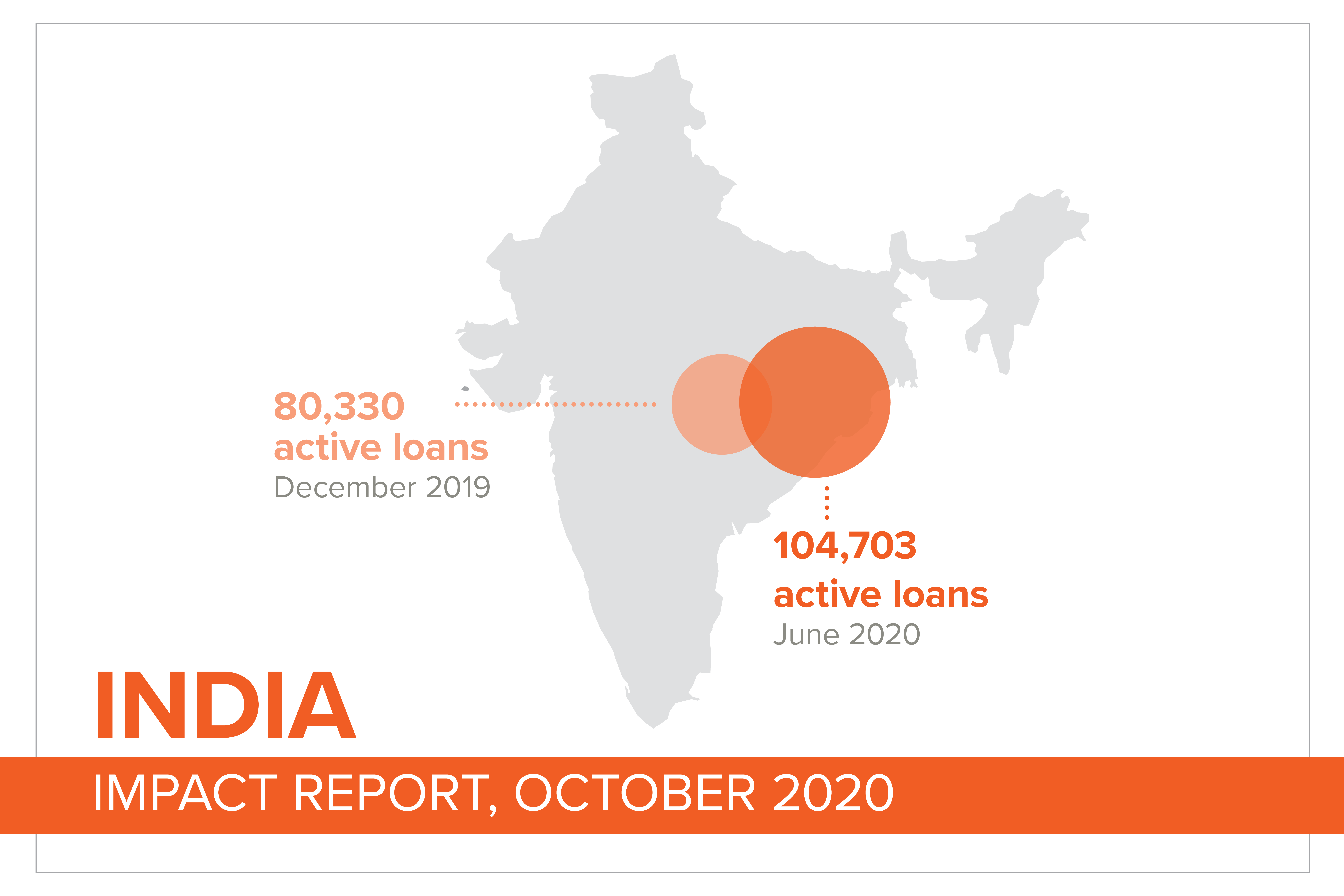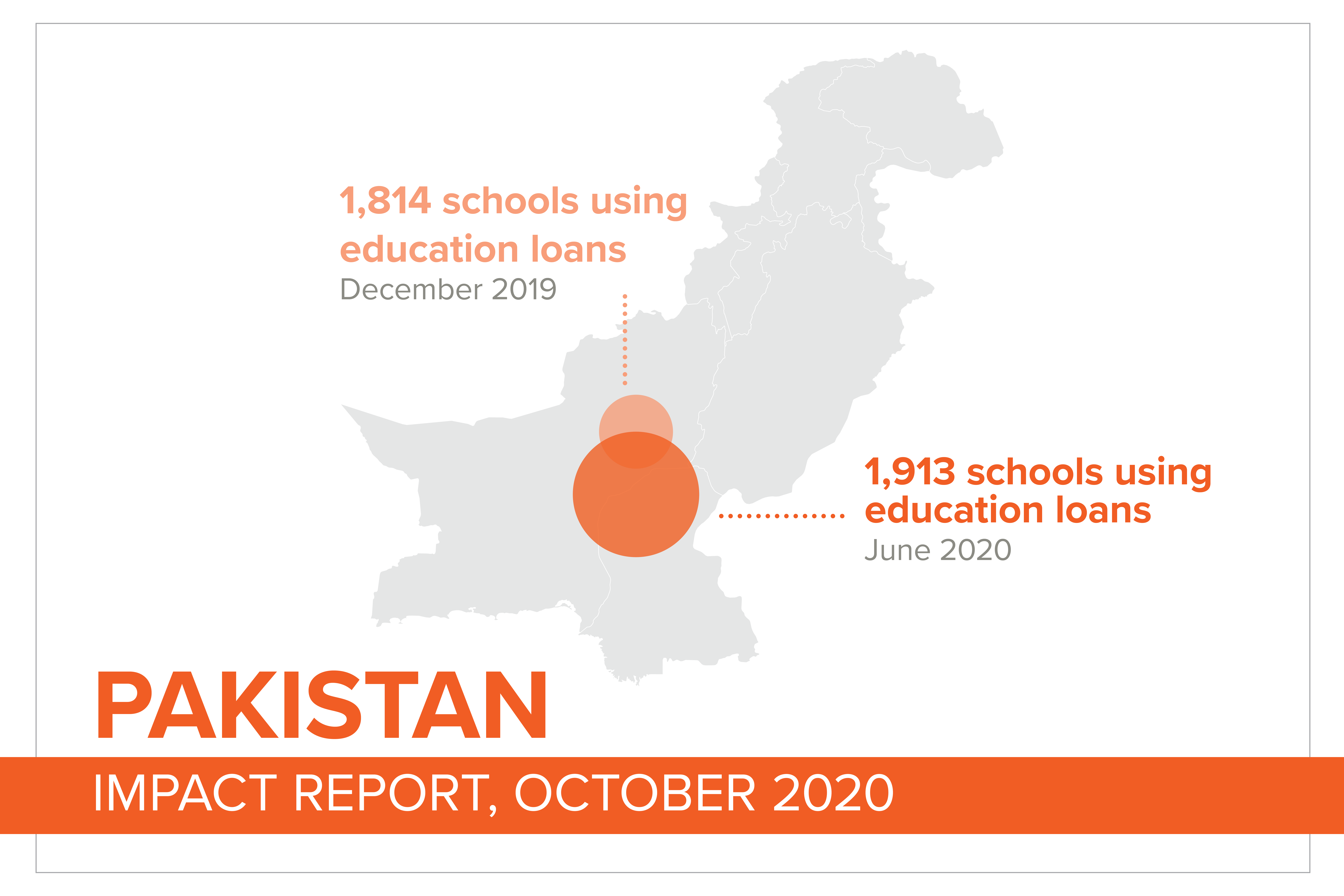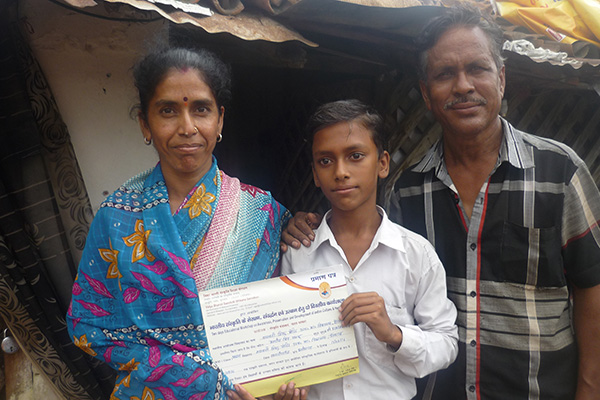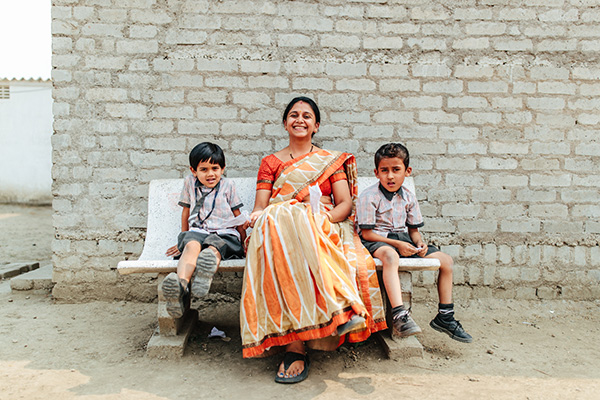using loans to make improvements in India
using loans to make improvements in Pakistan
Data to June 2020
*Understand Cumulative Child Impact
Strategic direction
The first half of 2020 was dominated by the impact of COVID-19 as most governments around the world temporarily closed educational institutions in an attempt to contain the spread of the pandemic. At its worst, at the beginning of April 2020, schools were closed in 193 countries, affecting 91.2 per cent of total enrolled learners which United Nations Educational, Scientific and Cultural Organization (UNESCO) estimated to be almost 1.6 billion students. By 30 June 2020, schools in 88 countries remained closed, including India and Pakistan, due to the COVID-19 pandemic. This affected 51 per cent of enrolled learners worldwide.
The main objectives of Opportunity’s Education Finance program through the crisis is to support schools to avoid their permanent closure so they can open again once lockdowns are lifted; support financial institutions that provide education finance to parents and schools so finance is available so that students can continue their education; and promote continued learning during school closures.
Throughout this crisis, Opportunity Global* has continued to provide technical assistance and support, albeit remotely, financial institutions that lend to affordable non-state schools. These low-fee educational institutions typically are not funded by the government and have low cash reserves. Temporary school closures significantly impact their income, as parents stop paying school fees, while the schools try to continue to pay teachers’ salaries which typically make up 50–60 per cent of total school budgets. The EduQuality team’s priority is to do what they can to support schools so that they can eventually reopen and not face permanent closure. Keeping the schools operational gives the best hope of students returning to school after the lockdowns. Opportunity’s EduQuality team is providing online resources to financial and educational institutions to support their survival through the crisis.
During this period, there was a slowdown in the disbursement of education loans: both school fee loans and school improvement loans. However, by 30 June 2020, the slowdown had begun to show signs of abating with financial institutions in India and Pakistan reporting overall growth in the number of loans disbursed to parents and schools compared with December 2019.
Partner performance
INDIA

By 25 March 2020, all educational institutions in India had closed, affecting more than 320 million learners. Initially during lockdown, some state governments in India passed orders of ‘no school, no fee collection’ which meant that even parents who had the means to pay could refuse and school fee payments declined.
Financial institutions that offer education loans have also been severely affected. The Reserve Bank of India (RBI) initially required financial institutions to offer a three-month moratorium to borrowers, which was later extended until 31 August 2020.
Despite the challenges, School Fee Loans grew with an additional 24,574 families able to cover the cost of sending their children to school in the period from Jan – June 2020. Overall, 170 fewer schools borrowed to fund improvements to infrastructure or to purchase fixed assets in the same period.
PAKISTAN
By 16 March 2020, all educational institutions in Pakistan had closed, affecting more than 320 million learners. Overall growth in School Improvement Loans from January to June 2020 slowed to an additional 143 schools using loans to make improvements so that children can access better education.
In Pakistan, 129 schools participate in EduQuality, a program of Opportunity EduFinance, that has provided additional support to weather the storm of the COVID-19 crisis. Of these schools, 80 per cent have competed a Pathways to Excellence Self-Assessment – a guide for school leaders to self-diagnose the quality of education at their school using 18 measurable indicators of school quality. Using the results of their assessment, 67 per cent have created a School Development Plan to improve areas of greatest need. In June 2020, the first School Leadership Professional Development Training seminars were offered through Zoom calls with recordings disseminated via WhatsApp for schools unable to attend.
Education Partner Summary, Asia
| Number of loans outstanding by type | Value of loans outstanding by type ($US) | |
|---|---|---|
| ISFC (India) |
2,439 school improvement** 327 tertiary institution** |
$43,126,049 $13,328,181 |
| ESAF (India) |
55,420 school fee** 3 tertiary tuition** 1 school improvement |
$22,533,278 $74,100 $40,374 |
| Shiksha (India) |
44,743 school fee 1,770 school improvement |
$10,567,810 $16,236,236 |
| SAFCO (Pakistan) | 44 school improvement | $43,750 |
| KASHF (Pakistan) | 1,913 school improvement | $1,639,667 |
| 106,660 | $107,589,445 |
*Opportunity Global is the implementing partner for the Education Program (Opportunity EduFinance and EduQuality) and along with Opportunity Australia, is part of the broader Opportunity International Network. Opportunity Australia provides funding to Opportunity Global to support the Education Program in Asia.
**School Improvement Loan – typically small to medium loans made to schools (non-state affordable), for the purposes of improving school infrastructure or the purchase of fixed assets.
School Fee – loan to parents for payment of school fees where children who are attending pre-primary, primary or secondary school.
Tertiary Tuition – loan to students for the payment of fees at a college or university.
Tertiary Institution – typically small to medium loans made to a college or university for the purpose of improving infrastructure or the purchase of fixed assets.
Leading a school during a pandemic
Ms Monica Nerwan, Rajasthan, India
Star Academy is led by Principal Monica Nerwan in the northern Indian state of Rajasthan, providing education to more than 1,000 students from K–12. Star Academy participates in EduQuality programming, which is designed to impact the quality of education children receive and fosters an enabling environment for learning.
Finding a way to teach students online during lockdown was Ms Nerwan’s greatest priority. Teachers have been providing content to parents via WhatsApp for primary school children and conducting Zoom classes for older students.
One of Ms Nerwan’s greatest concerns is the having to freeze teacher salaries. The school’s only revenue is school fees, which are collected in April at the beginning of the academic year. Most of the parents are daily wage earners or farmers who have lost their source of livelihood due to supply chain disruptions caused by the restrictions imposed to contain the spread of the virus. Many have returned to their home villages and will likely not come back until the economy recovers.
As part of the EduQuality program, Ms Nerwan has access to resources to help her navigate the management of a school through the COVID-19 crisis, as well as connection with other school leaders who face similar challenges during the pandemic.
Case study
COVID-19 Toolkit Resources
In response to the crisis, the EduFinance Technical Assistance Team used an online platform to develop and remotely deliver e-learning modules for the ongoing professional development of staff of financial institutions that were providing education finance to parents, schools, tertiary students and tertiary educational institutions. While in-person training sessions were suspended during lockdown, the online modules provided an alternative training mode for the staff of financial institutions, including loan officers, risk and credit teams and branch managers. The e-learning content was designed to be engaging and interactive, using the core EduFinance training topics usually delivered in-person and redesigning them for online engagement, adding in additional topics to specifically consider during temporarily school closures. In addition, the team also created a toolkit of guidance and tools for financial institutions to use related to the necessary changes in lending operations during the crisis, from engaging a remote workforce to stress-testing the institution’s financial position and liquidity. Opportunity’s EduFinance team also developed a COVID-19 Toolkit in response to the crisis to help schools participating in the EduQuality program deal with the crisis and temporary school closures. The content and approach of the Toolkit draws on lessons learned from past crises, including the Ebola crisis in West Africa and the earthquake in Pakistan in 2005. Tools and support services included training materials for school leaders on how to preserve cash and manage their schools, and training materials for teachers on how to engage parents and pupils throughout the period of school closures.
Recorded podcasts and other content are being delivered via multiple digital channels. For example, Facebook is being used to share the Toolkit resources, enabling school leaders to collaborate and discuss the challenges they face. Facebook Live events have featured education specialists and school leaders to present on specific topics. School leaders are also reached using WhatsApp, SMS, and direct phone calls. The Facebook group in Pakistan had 144 schools listed as members in June 2020.
More recently, resources called ‘Pathways to Reopening’ have been developed to guide schools as they prepare to reopen, which has been translated into six languages to date, including Urdu. The content focusses on five domains that schools will need to consider as they plan to reopen:
- Business planning and financial management
- Clean and safe environmentconducive to learning
- Teaching and learning
- Staff engagement
- Parent engagement
Each module has an accompanying podcast with country specific examples.
Impact Stories
Your support is empowering these women—and millions more like them—to create a new future for their families, free from poverty.

"I spend everything on my daughters’ education."
– Sindhu, Nagpur
Sindhu and Sikkander knew they wanted to educate all of their five daughters, no matter what the cost. Taking out yearly school fee loans made this education possible.

A recent study conducted by the University of Chicago’s Center for RISC in partnership with Opportunity, shows the importance of Opportunity’s EduFinance Program to improve educational outcomes for children.

"My daughter came first in the whole school!"
– Madhuri, Nagpur
Madhuri used to worry about how they would afford school fees for her children, Ria (4) and Yesh (5). Thanks to a school fee loan, she doesn’t worry about that any longer.

"Thank you for understanding what we wanted."
– Charanjeet, Dongargarh
Charanjeet's youngest son, Mandeep, is a talented student with dreams of becoming an engineer. A school fee loan is making his dreams possible.


